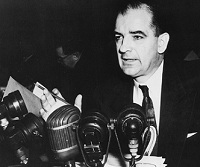The notion of McCarthyism is used to refer to the tendency or doctrine based on accusations of subversion or disloyalty that are made without respect for the rights of the accused individual and without considering the development of a fair trial . The concept derives from McCarthy , the surname of a US senator.
 Joseph McCarthy served in the United States Senate from 1947 to 1957 , representing the state of Wisconsin . During that decade, this Republican political leader became known for promoting investigations against a large number of people who, according to his position, were communists or Soviet agents infiltrated in various spheres of the State and public life.
Joseph McCarthy served in the United States Senate from 1947 to 1957 , representing the state of Wisconsin . During that decade, this Republican political leader became known for promoting investigations against a large number of people who, according to his position, were communists or Soviet agents infiltrated in various spheres of the State and public life.
Thus, McCarthy unfoundedly denounced and accused numerous opponents of the US government, promoting irregular processes and even the establishment of a “black list” that included anyone who could become a communist sympathizer.
McCarthy 's attitude led to the development of the concept of McCarthyism or McCarthyism .
Other interesting facts about McCarthyism are the following:
-Popularly, it was known as witch hunt.
-It was developed between 1950 and 1957.
-The blacklists that were shaped during this period included more than 360 people who were targeted for being “anti-American.” Among the best-known figures included in those mentioned were from Charles Chaplin to Bertolt Brecht.
-In the face of McCarthyism, different proposals arose. This would be the case, for example, of the so-called “Hollywood Ten.” These were a group of screenwriters and film directors who openly opposed having to make their political affiliations known.
-Among the many well-known faces who opposed McCarthyism and defended freedom were Gregory Peck, Lauren Bacall, Humphrey Bogart, Burt Lancaster, Kirk Douglas, Katherine Hepburn or even John Huston and William Wyler, among many others. Exactly these and other figures shaped the so-called First Amendment Committee that came to support the aforementioned “The Hollywood Ten.”
-Among the most relevant figures who did not hesitate to support McCarthyism and even point out some professionals in the film industry as anti-American or communists were Ronald Reagan, who would later become president of the United States, or Gary Cooper, among others.
-One of the personalities who helped put an end to McCarthyism was the trade unionist John Henry Faulk.
Currently the term is used generically to name situations where rulers, invoking “national security”, persecute opponents without respecting constitutional rights .
Take the case of the authorities of a country that order an investigation of those who, on social networks, make critical comments against the government. According to officials, these investigations are necessary to protect the country from possible attacks that affect democracy . However, many maintain that the rulers are engaging in McCarthyism and are trying to censor those who do not agree with their policies.
